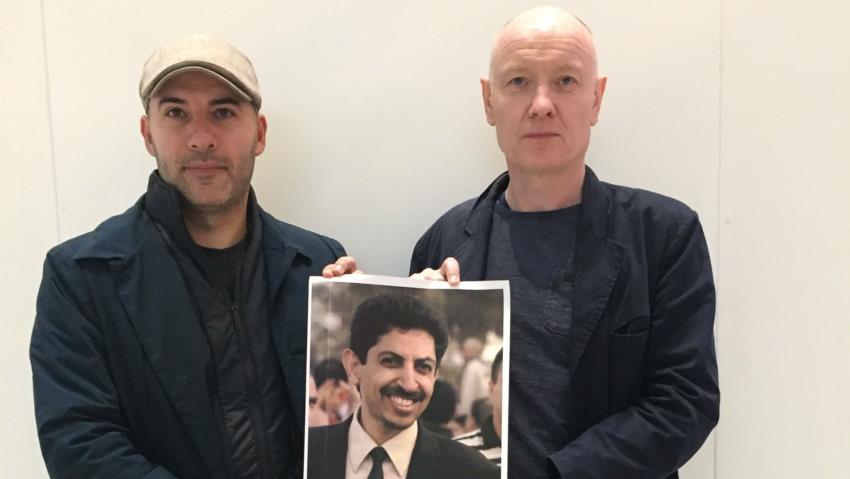On 3 April, Danish MP Lars Aslan Rasmussen and the Director of the Human Rights Defender program for Human Rights First (HRF) and advisor at Gulf Centre for Human Rights (GCHR), Brian Dooley, attempted to visit Abdulhadi al-Khawaja, a prominent jailed Bahraini human rights activist, to celebrate al-Khawaja’s 57th birthday on 5 April. The pair arrived in Bahrain, but waited for four hours before Bahraini airport authorities denied their entry and confiscated their passports. They alleged that Dooley and Rasmussen were a “security risk” and had failed to follow visa procedures. Airport authorities told Dooley and Rasmussen they needed to leave Bahrain, but refused to return their passports for over 24 hours. After being forced out of the country, Rasmussen told the Bahrain Institute for Rights and Democracy (BIRD), “We came to show that Al Khawaja and the other human rights activists in prison are not forgotten, and to remind the Danish government that it should be pressing much harder for his release.”
In the seven years following the 2011 pro-democracy protests, Bahrain intensified restrictions on access to foreign journalists, activists, and government officials who have been critical of the government and its human rights policies. For example, in 2013, United Nations (UN) Special Rapporteur on Torture Juan E. Mendez was invited to Bahrain but then disinvited shortly before his scheduled visit. This was the second time Rapporteur Mendez was invited and then disinvited to Bahrain. The government’s reasoning was that the National Dialogue was taking longer than expected and a visit could harm its success. But the cancellation of Mendez’s visit also fits the larger pattern of Bahrain’s refusal to work with the human rights mechanisms of the UN. Since 2006, Bahrain has repeatedly ignored or denied visit requests from numerous UN Special Rapporteurs and Working Groups.
Bahrain also denied guaranteed entry to US Representative and Co-Chair of the Tom Lantos Human Rights Commission Jim McGovern in August 2014, shortly after US Assistant Secretary of State for Democracy, Human Rights, and Labor, Tom Malinowski was expelled from Bahrain for meeting with leaders of the Al-Wefaq opposition group. McGovern had repeatedly requested entry for himself, a member of his staff, and HRF’s Brian Dooley to speak to members of the government, opposition, and civil society about the human rights situation in Bahrain. Deeply disappointed at the government’s refusal to grant him a visa, McGovern stated, “Not allowing me access to Bahrain serves to prove that the Bahraini ruling elite does not believe in its own claims of progress toward peace and reform.”
Bahrain has also taken tough measures against international journalists reporting on human rights. On 14 February 2016, American journalist Anna Day and her camera crew were arrested for covering protests on the fifth anniversary of Bahrain’s pro-democracy protests. Following her arrest, Bahraini police stated Day and her crew had “provided false information to concerned authorities” by claiming they were tourists rather than media. Similarly in 2012, several Channel 4 News journalists were arrested while filming a demonstration during the Formula One Grand Prix auto race in Bahrain. After being detained for almost six hours, the three journalists were deported back to the UK. Colin Freeman of the Sunday Telegraph was also arrested in 2012 along with blogger and activist Mohammed Mahdi on suspicion of participating in “illegal protests.” CNN correspondent Frederik Pleitgen was granted entry into Bahrain in 2012, but when he requested a three day visa extension to cover the Grand Prix his request was denied. Stuart Ramsay of Sky News was also denied entry into Bahrain and forced to report from Dubai.
As Abdulhadi al-Khawaja’s 57th birthday passes – as well as the seven-year anniversary of his arrest – it is important to remember that there is much work left to be done in Bahrain to promote and protect human rights. Journalist, activists, human rights defenders, and critics of the government are frequently denied entry visas. When they are able to enter the country, they are unable to operate freely, and they are often targeted by authorities, arrested, and detained for hours before being deported. Bahrain must lift these strict restrictions on the press and allow journalists, UN mechanisms, and US officials to enter and operate without fear of government reprisal.
McKenna Holman is an Advocacy Intern at ADHRB





